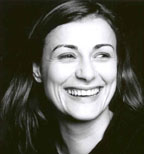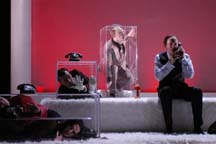|
IFranz Kafka's novel "Amerika" tells the story of the young immigrant Karl Rossmann who, following a scandal, finds himself banished to America by his parents. There, with unquenchable optimism, he throws himself into adventure after misadventure, and experiences multiply as he makes his way into the heart of the country, to The Great Nature Theatre of Oklahoma. Expected to redeem himself in this magical land of opportunity, young Karl is swept up instead in a whirlwind of dizzying reversals, strange escapades, and picaresque adventures.
New York 2002. Karl Rossmann a young European immigrant has to cope with his sudden downfall from the loftiest heights of a New Economy career, and the resulting new awareness of the strangeness and indifference of his surroundings.
What appears at first glance to be a possible continuation of Franz Kafka's novel is "God Bless America" the new play by the young Serbian writer Biljana Srbljanovic
Biljana Srbljanovic was born in Belgrade in 1970 and studied dramaturgy and theatre at the Academy of Dramatic Arts. In 1995 she concluded the first part of her "Belgrade Trilogy" which was staged for the first time in 1997 in Belgrade at the Dramatic Theatre of Yugoslavia. The play toured Western Europe and Scandinavia and was translated into German and English. dramaturgy and theatre at the Academy of Dramatic Arts. In 1995 she concluded the first part of her "Belgrade Trilogy" which was staged for the first time in 1997 in Belgrade at the Dramatic Theatre of Yugoslavia. The play toured Western Europe and Scandinavia and was translated into German and English.
The second part of the trilogy, "Stories of Family" was staged in 1998 by Atelier 212 and was awarded best new piece at the Novi Sad Festival. The third and final art was finished in 1999 and entitled "Pad / The Fall" and opened in 2000 at the Festival of Grad Tater in Budva, Montenegro.
In 2002 she received a Fulbright Scholarship and spent the following year writing and teaching in New York City. She is fluent in English, Italian and German, and resides and works in Belgrade. She also wrote "Amerika" which opened at Atelier 212 in November 2003.
The story takes place in New York, a little over a year after Al Qaida's attack on the United States. America is preparing for a new war, a  holiday shopping season is in full swing, and the streets are decorated, dazzling and beautiful. A two-hundred-year-old pine has been cut and put as a Christmas tree in front of the Rockefeller Center. Helicopters patrol the skies, the coast guard controls the water access to the city, the holiday shopping season is in full swing, and the streets are decorated, dazzling and beautiful. A two-hundred-year-old pine has been cut and put as a Christmas tree in front of the Rockefeller Center. Helicopters patrol the skies, the coast guard controls the water access to the city, the  special police forces guard all tunnels and bridges, and the city is safe, yet very tense.The front pages of the newspapers are crowded with photos of Muslim terrorists; somewhere, on some other pages, one could read a line or two on recession. It is very cold outside; cold wind from the special police forces guard all tunnels and bridges, and the city is safe, yet very tense.The front pages of the newspapers are crowded with photos of Muslim terrorists; somewhere, on some other pages, one could read a line or two on recession. It is very cold outside; cold wind from the  ocean has been blowing for days.A week before Christmas of 2002, New York is still the most beautiful city in the world. ocean has been blowing for days.A week before Christmas of 2002, New York is still the most beautiful city in the world.
For an American audience it is helpful to understand that prior to the four wars in the former Yugoslavia during the 1990s, Belgrade was an intellectual and cultural epicentre in Eastern Europe. Its affluent citizens well educated, traveled, and acquainted with the West's movies, books, and music. Belgrade was a destination city for Eastern Europeans, especially the young looking for more freedom, opportunities, intellectual discussion, artistic expression, and exciting nightlife. Belgrade's young people who came of age under Slobodan Milosevic's rule were raised by their parents to expect a certain lifestyle, even though they had been indoctrinated to disdain Capitalistic beliefs by the country's socialist government.
"Allow me to introduce myself: I am a person whose identity has been stolen. The only thing I can say with certainty about myself is that I am a woman, I am approaching midlife and that I am an inhabitant of Europe at the crossroads of a new millennium. All the remainder is rather vague, undecided and opaque." With these words Biljana Srbljanovic opened her speech at the award ceremony of the literary Ernst Toller Prize in 1999 that she won for "Family Stories." And she concluded: "I present the world as it is: garbage."
The play war written in 1998, a year after NATO's bombardment of Serbia. It approaches contemporary issues taken from a post-communist era as a warning for warning for what it means when living and surviving are one and the same: valence, vacuum, generation gap, uncertain teenagers, propaganda, xenophobia, love, disbelief, all given in a most subversive manner.
The play has already been performed with great success in most European cities: in Germany, France, the Netherlands, Poland, Slovenia, Italy, as well as in the United States and Chile.
Six years after the war in Yugoslavia and in a moment that the situation is fragile there and elsewhere in the world, Srbljanovic's play still reflects the equation of life and survival and asks questions about our uncertain future.
Using elements of vaudeville and absurdism, Srbljanovic creates a highly theatrical, farcical world to explore the intergenerational impact of political violence in her native Belgrade Her most recent project "Alice" premiered in September 2004 in Belgrade.
The theme can be described as Alice in EU-land. An incomprehensible bureaucratic world, where only the special few have access. A Europe that not even all the European countries have access to.
Biljana Srbljanovic is also a part-time lecturer at the Academy of Dramatic Arts.
The ambitious playwright has tackled a serious and universal theme in exploring the ways that violence and fear in the home sustain communal violence and warfare. She does this creatively, emerging as a talent to watch.
|